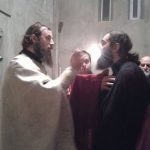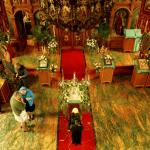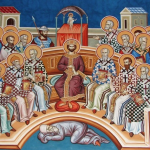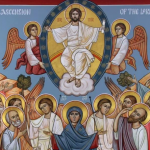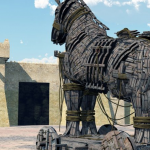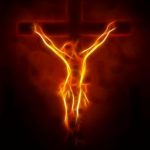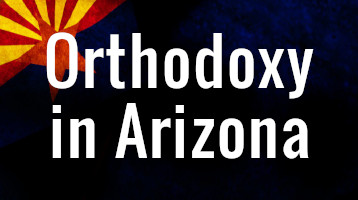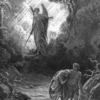by Fr. Patrick Henry Reardon Adult converts to the Orthodox Church often remark on a sense of relief---not to say liberation---they felt when they became acquainted with Orthodoxy's teaching on Salvation. I have heard testimonies on this point times out of mind. These folks, coming mainly from Western Christian backgrounds, had previously thought about Salvation chiefly in forensic terms. They were accustomed to hearing the word "merit" a lot with respect to the Cross. Their former Soteriology might be summarized in Archbishop Cranmer's lines in The Book of Common Prayer, which declare that on the Cross Jesus Christ, "by his one oblation of himself once offered," made "a full, perfect, … [Read more...]
Six Men Who FAILED to Paganize the Origins of Christmas
by John Sanidopoulos Every Christmas season, the usual myths are hauled out and distributed for popular consumption. You know them. We’ve all heard or read them. That Christmas celebrations were stolen from the Romans The Christmas tree is a pagan hangover That other gods had virgin births That Yule and the mistletoe are all about Odin These falsehoods are repeated often and loudly, under the guise of being “historical truths.” And strangely they still stump most Christians, who are then filled with doubt about what they believe. Of course, these myths were designed to elicit precisely this sort of reaction from believers. All of them were invented in the 18th- and … [Read more...]
The Holy Eucharist: A Live Coal
by Fr. Patrick Henry Reardon Speaking of the Holy Eucharist, the Fathers and early liturgical texts of the Church have recourse to the metaphor of the flaming coal (anthrax, pruna) in reference to the Lord’s body. For instance, with Isaiah 6:7 obviously in mind, The Liturgy of St. James refers to “receiving the fiery coal” (labein to pyrinon anthrax) from the Eucharistic altar. Indeed, even without using this word, those same doctrinal sources regularly appeal to Isaiah’s experience, when they speak of the Holy Eucharist. Thus, in The Liturgy of S. John Chrysostom, when the Christian has received the Holy Communion, the priest tells him: “Lo, this has touched your lips and has … [Read more...]
An Uncomplicated Truth
by Fr. Patrick Henry Reardon It is reasonable, I suppose—or at least natural—for modern students of religion to wonder how the earliest Christians, all of them Jews, were able to reconcile their belief in the divinity of Christ with the monotheism enshrined in Israel’s Sh’ma’. Indeed, historians of Christian thought have devoted many studies to that inquiry. Looking at the apostolic writings through the lens of this inquiry, I gain an interesting impression of the earliest Christians: Their confession of the divinity of Jesus, while it was difficult, seems not to have been complicated. First, the recorded difficulty of the apostles was not an impasse of reason (“How can this Jesus be both … [Read more...]
On the Unique and Exclusive Presence of the Holy Spirit in the Church
by Fr. Patrick Henry Reardon Christ's greatest gift to the Church is the gift of the Holy Spirit; this gift is, moreover, original, unique, and exclusive. Now if someone finds this assertion unsurprising, I suspect he may not have given it the critical reflection it calls for. There should be at least a few faithful Bible-readers, I think, who are disposed to wonder if it is true. Consider, for instance: Does not our hymnography proclaim that the Holy Spirit is "everywhere present and filling all things"? Since the Spirit hovered over the face of the deep in the first instance of Creation, doesn't He already fill the length and breadth of the Universe? And, moreover, doesn't the … [Read more...]
On Pentecost
St. Gregory Nazianzus "the Theologian" Our father among the saints Gregory the Theologian , also known as Gregory of Nazianzus (though that name more appropriately refers to his father) and Gregory the Younger, was a great Father and Teacher of the Church. He was a close friend of St. Basil the Great. He was one of the great Cappodocean Fathers, and is one of only three saints given the title “Theologian” in all of Orthodox hagiography and theology. I. Let us reason a little about the Festival, that we may keep it spiritually. For different persons have different ways of keeping Festival; but to the worshiper of the Word a discourse seems best; and of discourses, that which is best … [Read more...]
Why Is the First Council of Nicea So Important?
by Fr. Lawrence Farley Those for whom ancient history is irrelevant and who equate “old” with “out-dated” (or better yet, “medieval” with “barbarically primitive”) will have trouble appreciating the Fathers of the First Council of Nicea, since they met and produced their work well over a thousand years ago, in 325 A.D. How could a creed so old be remotely relevant today? Accordingly, some churches have produced their own creeds (such as the United Church of Canada, which produced its own creed for alternative use in 1968. It is a cautionary tale, for it began “Man is not alone; he lives in God’s world” and they soon enough found that political correctness demanded its alteration to … [Read more...]
Why Didn’t the Holy Spirit Come Right After the Ascension?
by St. John Chrysostom But why did the Holy Spirit come to them, not while Christ was present, nor even immediately after his departure, but, whereas Christ ascended on the fortieth day, the Spirit descended “when the day of Pentecost,” that is, the fiftieth, “was fully come?”(Acts 2:1) And how was it, if the Spirit had not yet come, that He said, “Receive ye the Holy Spirit?” (John 20:22) In order to render them capable and meet for the reception of Him. For if Daniel fainted at the sight of an Angel (Dan. 8:17), much more would these when about to receive so great a grace. Either this then is to be said, or else that Christ spoke of what was to come, as if it came already; as … [Read more...]
Christ: The “Trojan Horse” of Redemption
by Fr. Patrick Henry Reardon The same monastic tradition that determined the psalms to be prayed at Thursday Matins also prescribed Psalms 75 and 91 (Hebrew 76 and 92) to be recited at Matins of Friday (Cf. The Rule of Saint Benedict, ch. 13). Because this sixth day of the week is “the day on which the Bridegroom is taken away” (Mark 2:20), the Church has always, from apostolic times, kept it as a fast day (Didache 8.1). Consequently, it is hardly surprising to find the theme of the Lord’s Passion in Psalms 75 and 91. The emphasis on the divine anger in these two psalms, however, differs considerably from that of the Thursday psalms. Whereas Jesus faces God’s wrath in Psalms 87 and … [Read more...]
“To Whom Was the Blood of Christ Offered” by St. Gregory the Theologian
By St. Gregory the Theologian More on Atonement – an Excerpt from “On Holy Pascha”, Homily 45 Now we are to examine another fact and dogma, neglected by most people, but in my judgment well worth inquiring into. To whom was that Blood offered that was shed for us, and why was it shed? I mean the precious and renowned Blood of our God and High Priest and Sacrifice. We were detained in bondage by the Evil One, sold under sin, and receiving pleasure in exchange for wickedness. Now, since a ransom belongs only to him who holds in bondage, I ask to whom was this offered, and for what cause? If to the Evil One, fie upon the outrage! If the robber receives ransom, not only from God, but a … [Read more...]
- « Previous Page
- 1
- …
- 6
- 7
- 8
- 9
- 10
- Next Page »


